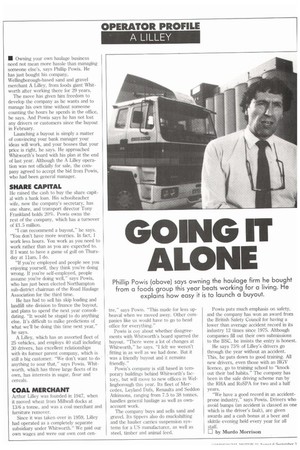GOING IT ALONE
Page 42

If you've noticed an error in this article please click here to report it so we can fix it.
• Owning your own haulage business need not mean more hassle than managing someone else's, says Philip Powis. He has just bought his company, Wellingborough-based sand and gravel merchant A Lilley, from foods giant Whitworth after working there for 29 years.
The move has given him freedom to develop the company as he wants and to manage his own time without someone counting the hours he spends in the office, he says, And Powis says he has not lost any drivers or customers since the buyout in February.
Launching a buyout is simply a matter of convincing your bank manager your ideas will work, and your bosses that your price is right, he says. He approached Whitworth's board with his plan at the end of last year. Although the A Lilley operation was not officially for sale, the company agreed to accept the bid from Powis, who had been general manager.
SHARE CAPITAL
He raised the cash to buy the share capital with a bank loan. His schoolteacher wife, now the company's secretary, has one share, and transport director Tony Frankland holds 20%. Powis owns the rest of the company, which has a turnover of .E1.5 million.
"I can recommend a buyout," he says. "You don't have more worries. In fact, I work less hours. You work as you need to work rather than as you are expected to. If I want to have a game of golf on Thursday at llam, I do.
"If you're employed and people see you enjoying yourself, they think you're doing wrong. If you're self-employed, people assume you're doing well," says Powis, who has just been elected Northampton sub-district chairman of the Road Haulage Association for the third time.
He has had to sell his skip loading and landfill site division to finance the buyout, and plans to spend the next year consolidating. "It would be stupid to do anything else. It's difficult to make predictions of what we'll be doing this time next year," he says.
A Lilley, which has an assorted fleet of 25 vehicles, and employs 40 staff including 30 drivers, has excellent relationships with its former parent company, which is still a big customer. "We don't want to do anything to sour that," says Powis. Whitworth, which has three large fleets of its own, has interests in sugar, flour and cereals.
COAL MERCHANT
Arthur Utley was founded in 1947, when it moved wheat from Millwall docks at 13/6 a tonne, and was a coal merchant and furniture remover.
Since it was taken over in 1959, Lilley had operated as a completely separate subsidiary under Whitworth." We paid our own wages and were our own cost cen tre," says Powis. "This made for less upheaval when we moved away. Other companies like us would have to go to head office for everything."
Powis is coy about whether disagreements with Whitworth's board spurred the buyout. "There were a lot of changes at Whitworth," he says. "1 felt we weren't fitting in as well as we had done. But it was a friendly buyout and it remains friendly."
Powis's company is still based in temporary buildings behind Whitworth's factory, but will move to new offices in Wellingborough this year. Its fleet of Mercedes, Leyland Dafs, Renaults and Seddon Atkinsons, ranging from 7.5 to 38 tonnes, handles general haulage as well as ownaccount work.
The company buys and sells sand and gravel. Its tippers also do muckshifting and the haulier carries suspension systems for a US manufacturer, as well as steel, timber and animal feed. Powis puts much emphasis on safety, and the company has won an award from the British Safety Conned for having a lower than average accident record in its industry 12 times since 1975. Although companies fill out their own submissions to the BSC, he insists the entry is honest.
He says 75% of Lilley's drivers go through the year without an accident. This, he puts down to good training. All new drivers, even those with an HGV licence, go to training school to "knock out their bad habits." The company has been in the safe driving scheme run by the RHA and RoSPA for two and a half years.
"We have a good record in an accidentprone industry," says Powis. Drivers who avoid bumps (an accident is classed as one which is the driver's fault), are given awards and a cash bonus at a beer and skittle evening held every year for all staff.
by Murdo Morrison
































































































































